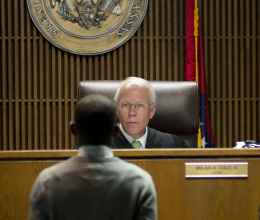
ACLU of Arkansas Press Conference on Robinson v. Payton
Date: July 9, 2013
Present: Rita Sklar, ACLU of Arkansas Executive Director; Eva and Ron Robinson and their son, Matthew; Holly Dickson, ACLU of Arkansas Legal Director, and the cooperating attorney for the ACLU, Pat James.
Statement by Rita Sklar
This is a story about abuse of police powers and disregard for the public trust.
On a September night in 2011, Eva Robinson and her then 16-year-old son Mathew were walking the family Schnauzer outside their home in Dover, Arkansas. Dover Deputy Marshall Steven Payton of the Dover Marhsall’s Office saw the Robinsons as he drove by. Matthew waved, thinking he knew the officer. Neither, it turned out, knew the other. Saying later he thought Matthew’s behavior was suspicious, Payton pulled over and turned on the blue lights. He confronted Matthew and aggressively and persistently shouted questions at him about drugs. The Robinsons were both stunned. Eva, completely taken aback by such a strange thing happening to them, in Dover, population 1500 or thereabouts, where her husband lived for over 40 years, she’d lived for 20, and her children were born. She suggested they all go to her house a few feet away to straighten things out.
Instead, Deputy Payton detained them in his patrol car and called for “backup,” since he was “outnumbered”; when Sgt. Kristopher Stevens of the Pope County Sheriff’s Department and Cpl. Stewart Condley of the Arkansas State Police arrived, tensions escalated. Matthew attempted to get out of the car as ordered, but with his large frame, and size 16 shoe stuck under the front seat, he struggled to extricate himself and reached up to an officer for help. Instead of helping Matthew, the officer stunned Matthew with a Taser, later saying he thought Matthew’s move was an act of aggression. The horrified Eva, threw herself over her son to protect him from what she thought was a real gun: she got tased as well.
Officers dragged Matthew out of one side of the car, and Eva, the other. Matthew was thrown to the ground, beaten, choked and hit in the groin, and his mother, slammed repeatedly against the car while she was being handcuffed.
If it seems hard to believe, that’s because it is.
We entrust our police officers with great power—the power to detain, arrest, and use deadly force if necessary: we have the right to expect the utmost professionalism and good judgment from them in return. With that power comes trust.
Sometimes we forget that police officers are ordinary people. For their courage they deserve our respect; but we have to remember that as human beings they make mistakes, they are not infallible, and they should be accountable to us, the people who have hired them to do the job.
Across the country, Americans are much more likely to believe a police officer than a civilian. Many police officers serve courageously and well and deserve our utmost esteem. But esteem should not be mistaken for reverence. Mistakes, bad judgment and bad officers exist. The police should receive the best training, be required to have the highest credentials, and be held accountable to the highest standards. They should also be compensated adequately. They should respect the people they are sworn to protect, know the law and uphold people’s constitutional rights, and use force responsibly and only as necessary.
Currently in Arkansas there is no independent agency or organization that takes complaints from people about police misconduct. The ACLU and many community organizations have lobbied long for one to no avail, with police saying they can police their own. In a job requiring so much of the public trust, people should be able to file a complaint with an independent agency about a police officer or department, and know that it will be investigated and handled appropriately with the public’s best interest at heart.
There was nowhere for the Robinsons to go. So here we are in federal court, hoping to make sure that what happened to the Robinsons doesn’t happen to anyone else.




